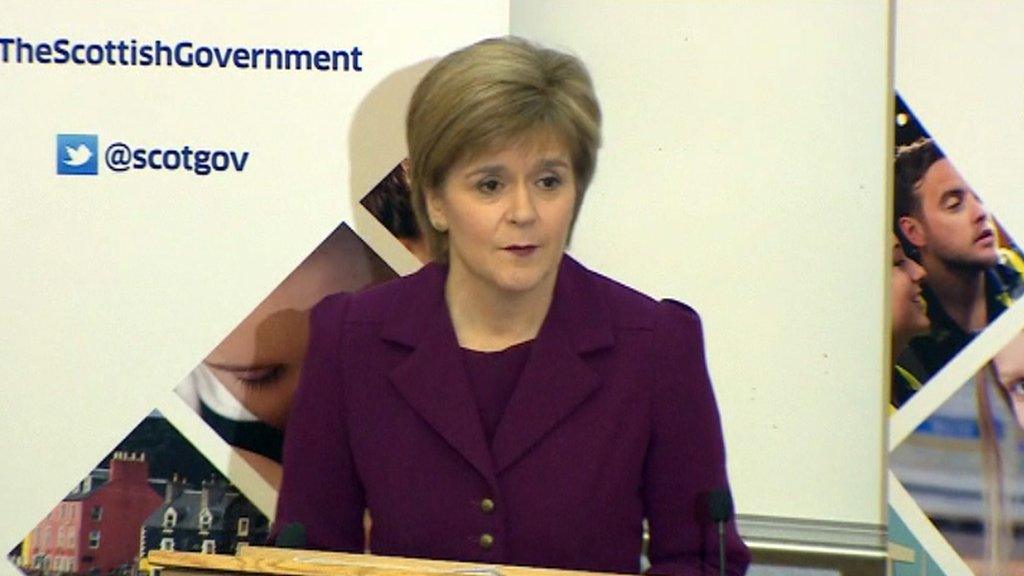Election 2015: Can Nicola Sturgeon win over the UK?
- Published
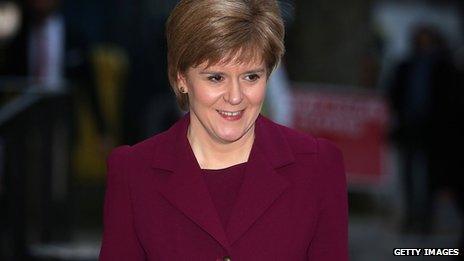
Her party is only standing in Scotland and wants to end the union, but what is the view outside Scotland of Nicola Sturgeon?
When Nicola Sturgeon stepped out on to the stage at the leaders' debate last Thursday, she did so as someone many outside Scotland will have known little about.
Scotland's first minister and SNP leader for less than 6 months, she has never held office outside her home country.
Until the resignation of Alex Salmond following defeat in the independence referendum, she often took a back seat.
She's not even standing at the general election.
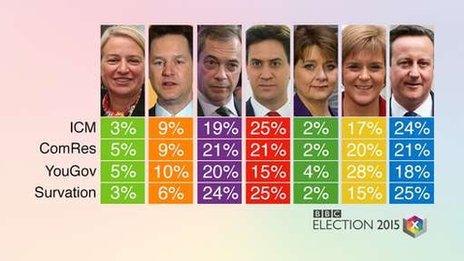
Polls suggest Nicola Sturgeon was well-received in the TV debate
But Ms Sturgeon left the debate having impressed a UK-wide audience, polls suggested. YouGov identified her as the winner, with 28% of those polled across the UK saying she had given the best performance. Other snap polls put her in the top four.
She fared well in much of the subsequent newspaper coverage too. In his round-up of the immediate post-debate analysis, media writer Roy Greenslade noted, external: "Across all the newspapers, there was praise for Ms Sturgeon's performance."
'Message of friendship'
Key priorities
SNP
Main pledges
- Spending increase of 0.5% a year, enabling £140bn extra investment
- Annual UK target of 100,000 affordable homes
- Increase in minimum wage to £8.70 by 2020
- Restore the 50p top income tax rate for those earning more than £150,000; introduce a mansion tax and a bankers' bonus tax
- Build an alliance against the renewal of Trident
- Retain the triple lock on pensions and protect the winter fuel allowance
Polls in Scotland suggest the SNP is on course to significantly increase its number of seats on 7 May, making the party a significant player in a potential hung parliament. As a result, Ms Sturgeon is attracting increased attention south of the border.
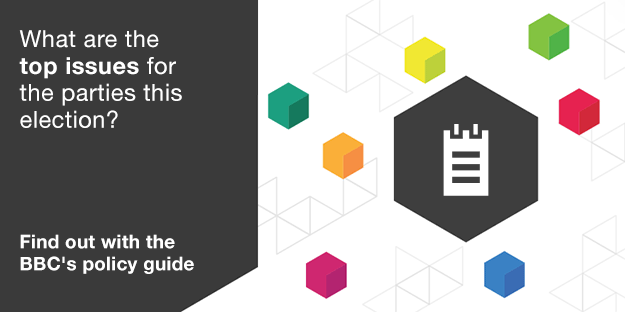
She has sought to portray herself as an ally of like-minded politicians outside her home country.
"I know it's not just people in Scotland who feel let down by Westminster politics," she said in her opening statement at last Thursday's debate.
"That's why my message to those of you watching in England, Wales and Northern Ireland is one of friendship."
Ms Sturgeon's pitch to the rest of the UK has intensified over recent weeks. She used University College London for a keynote speech to attack "austerity economics" in February, before travelling to the city again in March to criticise the UK's "crumbling" institutions.
On that occasion, she told students at the London School of Economics that her party could work to bring "positive change across the UK".
She has also been a keen advocate of a so-called "progressive alliance" of anti-austerity MPs.
But is that message having any effect?
'Unknown quantity'
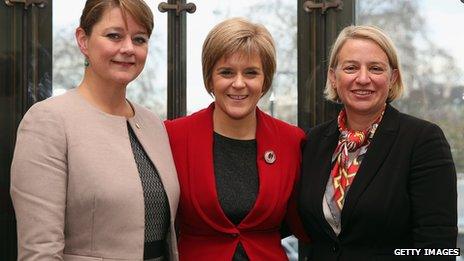
A "progressive alliance" involving Leanne Wood's Plaid Cymru and Natalie Bennett's Green Party has been suggested
A YouGov poll conducted in March showed Ms Sturgeon had a higher UK-wide net approval rating than David Cameron, Ed Miliband or Nick Clegg. But it also suggested she was the party leader from the four the most people had no opinion on - 42% saying they didn't know whether she was doing a good job or not.
Joe Twyman, head of political and social research at YouGov, says Ms Sturgeon was an "unknown quantity for most viewers" before the seven-way TV debate. But her profile increased - in a positive way - as a result of her appearance, he believes.
"Since then, she has definitely appeared on people's radars," he says. "Even in England and Wales she came top in 'who did best' questions."
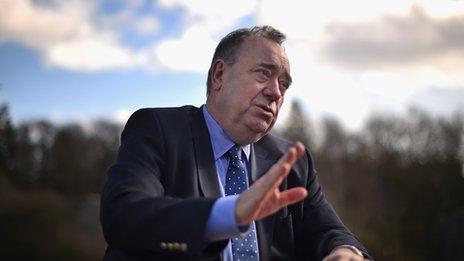
Ms Sturgeon has adopted a different tone to her predecessor Alex Salmond, said her biographer
David Torrance, who has written a biography of Ms Sturgeon, thinks her comments aimed at the rest of the UK will help her appeal.
"What she did brilliantly was dual pitch... a message to both Scotland and the rest of the UK," he said.
The SNP leader adopted a "different tone" from former SNP leader Alex Salmond, Mr Torrance added, showing she wants to "detoxify" her party's image in the rest of the UK.
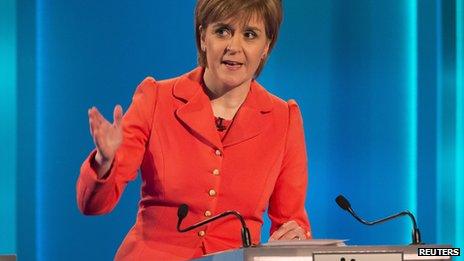
Despite Ms Sturgeon's popularity, polls suggest people do not want the SNP to hold the balance of power
It didn't work for everyone. The Daily Mail's front page headline on the Saturday after the debate described Ms Sturgeon as the "most dangerous woman in Britain". In an accompanying commentary, external, columnist Chris Deerin acknowledged Ms Sturgeon had "clearly impressed" a UK audience, but said SNP influence over a minority Labour government could lead to "incalculable consequences for our political system."
Her performance won plaudits elsewhere. In the Guardian, Jonathan Freedland wrote, external the SNP leader "will have had plenty of non-Scottish Labourites nodding approvingly, even a tad enviously of those who can vote for Sturgeon's party." BuzzFeed ran a list, external of tweeters in England saying they wanted to vote SNP. "Can I vote for the SNP" was the sixth most searched item on Google during the programme, according to the search engine.

The view on the street
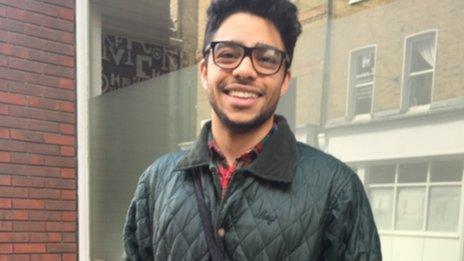
Carrado Manzai preferred Sturgeon to Salmond
BBC News took to the streets of Soho in central London the weekend after the debate to see what the public thought of Nicola Sturgeon. Some said they had never heard of the SNP leader, but here are the views of some who had:
Sarah Rowe, a 28-year-old charity worker, said she liked Ms Sturgeon's message: "In the closing and opening statements, she said something positive. Whereas Nick Clegg is basically now saying I'm not as bad as the other two and I think everyone else was very negative. Nicola Sturgeon had a better vision and I think that's what our politics has been missing."
Sam, 36, works in finance. He did not watch the debate, but says he is "quite anti-SNP". "I don't know much about her - she looks a bit sour if I was to go purely by her looks," he says. Would he be happy with the SNP working with another party to govern at Westminster? "I could see them being in with Labour, but it's not a government I would vote for."
Carrado Manzai, 21, said he didn't know who Ms Sturgeon was before the debate. "I thought she was really good," he says. "She was more sensible than a lot of the other party leaders." The student said he prefers her to former SNP leader Alex Salmond: "I think she is more diplomatic, I think she's more of a statesman. She's also very frank and honest."
George Berry, 29, was also attracted by what the SNP leader had to say. "I was very impressed with her after the debate," the teacher said. "But I was impressed with Nick Clegg after the last debate, so I don't know. I don't know a lot about her political views, her policies. She seems pretty left of centre, which I quite like, but I know nothing else to be perfectly honest."

Ms Sturgeon's personal approval ratings do not necessarily translate into more support for her party and its politics south of the Scottish border, says YouGov's Joe Twyman.
Although support for SNP influence at Westminster rose slightly after the debate, most people still do not want the party to be in a position of significant power at UK level, he says.
Some 58% of people questioned for the latest YouGov survey - conducted after the debate - think the SNP holding the balance of power after 7 May would be a bad thing. That figure is down only marginally, from 63%, in a similar poll carried out in March.
A quarter of people, in comparison, think the SNP holding the balance of power would be a good thing, the poll suggests. That figure is up from 15% last month.
That may be down to a disconnect between personalities and active support for a party and its policies, says Mr Twyman.
"People are willing to say Nicola Sturgeon did well in the debates - but I do not think we are seeing a massive change in support for the SNP's position," he adds.
- Published28 March 2015
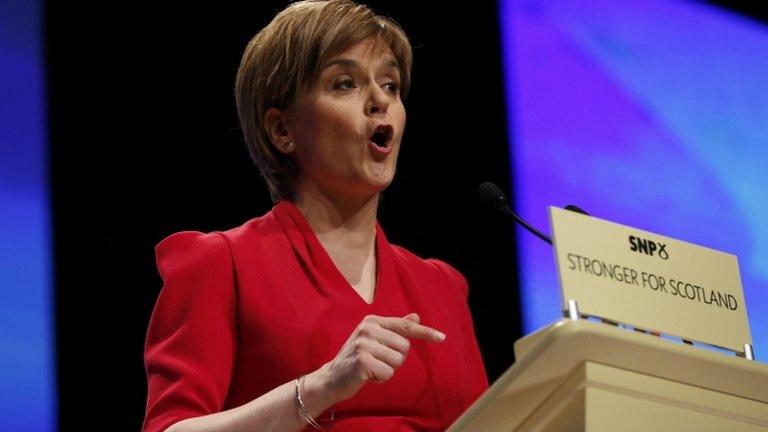
- Published16 March 2015
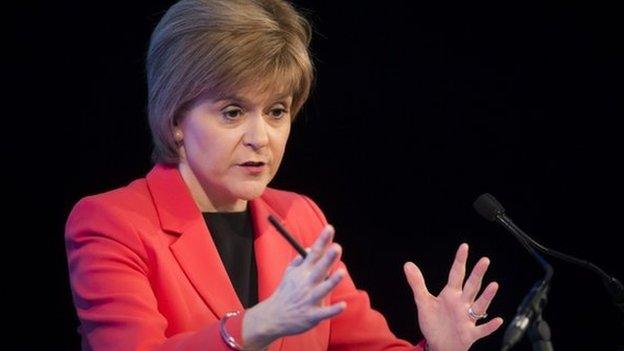
- Published11 February 2015
